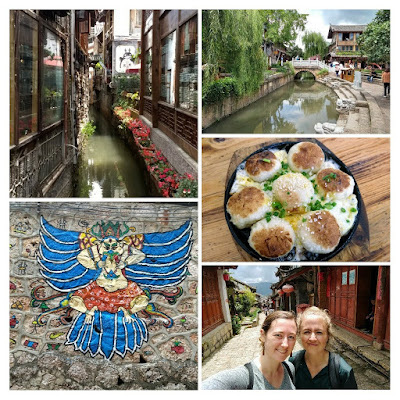10 Tips for Travel in China
China is one of the biggest countries in the world, both in terms of physical size and population, and has some truly incredible places to see. Not to mention a rich and diverse culture, amazing food, interesting people, and more. So it sounds like a wonderful place to travel - and it is - but unfortunately it's also fairly challenging to navigate, even for more experienced travelers.
I've been living in China for two years now and I've traveled around 5 provinces at this point. I've also been attempting to learn Mandarin and I've reached a survival level that gets me by pretty well in daily life and when traveling here. I've enjoyed most of my trips around China so far and really learned a lot from them. Here's some of my tips for how to travel in China as stress-free as possible.
 |
| The Chen Clan Academy in Guangzhou, one of many museums that required my passport to enter |
1. Always bring your passport
Whether you're going to a hospital or a museum, a post office, the train station, etc., you could be asked for your passport. China is big on identification and even if you live in China and receive a work permit card, it is not as reliable as your passport. For travelers, especially remember to bring it when visiting a museum, at a train or inter-city bus station, domestic flights, and when checking into a hotel.
2. Book in advance
China has a big population, which means things tend to sell out quickly, especially if it's the peak season. The most important things to book in advance are flights and train tickets. Things like buses you may not be able to book in advance and usually are less likely to sell out. Hotels should be booked ahead of time if it's a popular place in the peak season; if not, you may be able to find something after arrival.
3. Trip.com
The best way to get train tickets in China is the website Trip.com (formerly Ctrip). It is in English and relatively easy to navigate, although it sometimes has its quirks. When booking, make sure your passport number is entered without any errors, or you will probably lose the ticket. Also, make sure you receive an email with a confirmation that the ticket was booked, including a confirmation number.
4. Treat the train station like an airport
When taking a train in China, you'll first need to go to the ticket window, show them your passport and ticket confirmation number, and have your tickets printed. There will often be long lines for this. Sometimes I've gotten lucky and only waited a few minutes; other times it's taken nearly an hour. If you have an early train, it's a good idea to get it printed the day before. And if you have multiple train tickets, you can get them all printed at once (just show each confirmation number). Next you'll have to go through a security check. Usually the lines are short but in some cases (like around the Chinese New Year or National holidays in October) the lines can be very long. Finally, you may need to show your passport and ticket again to get to the platform. Most stations have machines that scan Chinese ID cards and often cannot scan passports, so look to the far left or right where usually there is a staff member checking ID's that can let you through.
 |
| Using WeChat to pay at a shop (image source) |
5. WeChat
The two biggest social media apps in China are WeChat and QQ. I'm not a big fan of either of them, but WeChat is by far the better of the two. DO NOT download QQ unless it's necessary for some reason. It's a horrible drain on your phone battery since it often runs in the background and it is very invasive. WeChat is invasive as well, but it is such a helpful tool in China that I see it as a necessary evil. It can be used to pay electronically for almost anything, to make video or regular calls, to access maps, to purchase tickets for entertainment or transportation, etc. English versions of WeChat can be downloaded, but some parts of the app will remain Chinese only (like ticket purchasing). It's great for travelers though as you can add a hotel/hostel/airbnb host as a WeChat contact and use the app to find the hotel, make a call, etc.
 |
| Amap, a Chinese map application for your phone (image source) |
6. Maps
Most of the maps that westerners are familiar with do not work in China, such as Google maps. If you can read even a little Chinese, I highly recommend the Chinese app called A Map. It is usually really accurate and has helpful information about local public transportation. It has saved me a lot of money on taxis when traveling. If you can't read Chinese, then you could try downloading Maps.me (remember to download the regional map for wherever you're going). Maps.me will work offline, making it really helpful if you don't have a Chinese SIM card. Or if you have WeChat you can use its map to navigate when online.
7. The internet
Personal VPNs are allowed in China (at least as of this post) and they are incredibly important for accessing anything that is beyond the firewall. If you don't know already, the Chinese government blocks a wide range of websites, everything from Facebook to Google to Wikipedia. So make sure to download a VPN before arriving. When you're here, if you either don't have a VPN or it won't connect, you can use Bing.com rather than Google as a search engine. Bing is not a very good search engine, but it's better than nothing. It does have a decent translator as well, which you can find simply by typing "translate" into Bing. Remember to choose "Chinese simplified" in mainland China.
 |
| We stayed at one of the smaller, lesser-known villages in the Longji Rice Terraces - it was lovely and quiet! |
8. Go off the beaten path
Tourism in China often means huge organized tours of crowds of people piling into buses, being shouted at for hours by someone with a loudhailer, being marched around with almost no time to relax and enjoy anything, and a constant feeling of stress. There are some destinations, like Zhangjiajie National Park, where it feels like there is no escape from the massive, noisy tour groups and therefore are not really worth visiting in the peak season. There are others where you can visit them, but try to make an effort to find a hotel slightly outside the "best area" and look for activities that will also take you off the beaten path. For example, you could choose to hike Tiger Leaping Gorge rather than taking a Chinese style bus tour through it. In my experience at least, hiking it was really rewarding and beautiful; the massive crowds I saw lined up to take selfies along the road or sitting around in buses did not look like they were having such a great time.
 |
| On a hiking trip in Guangxi's Shanglin County, we made some friends at a local hotel where we ate lunch |
 |
| Learning about Naxi culture from a young woman in Lijiang |
9. Find ways to engage with the local people
There's no denying that there's a big language barrier when traveling in China. Not many people speak English well, and if you don't speak Mandarin, you may find yourself suffering from culture shock and feeling negatively about the people here. Keep in mind that while tourism and bureaucracy can be frustrating, there are still so many wonderful people, many of whom would be really happy to make a connection with a foreign visitor. In my experience, trying to stay at family owned hotels, especially hotels run by someone from the local community, eating and shopping locally, and making an effort to be friendly can really pay off. For example, this summer I stayed at a Zhuang ethnic minority family's hotel in the Longji Rice Terraces. The family was so friendly and hospitable and really fun to talk to, even with my limited Mandarin. Meeting them was a big part of why I enjoyed staying there.
 |
| The lower gorge trail at Tiger Leaping Gorge |
 |
| Trying some home-made yak jerky at a Tibetan family's home - a little chewy, and very delicious |
 |
| Nothing better than some hot, fresh from the grill tofu skins! |
10. Be adventurous
I often run into western travelers in China who just want to complain about how the food is too greasy/spicy or how they don't understand why people do things in a particular way. I will be the first to admit that traveling here does have its difficulties, but try to accept that the culture shock is part of the adventure. Keep an open mind and try saying yes to new experiences. Try some of the food that looks strange to you - it might surprise you. Try wandering away from the backpacker/tourist path. China has so much to offer if you are willing to be brave and just try it.




Comments
Post a Comment